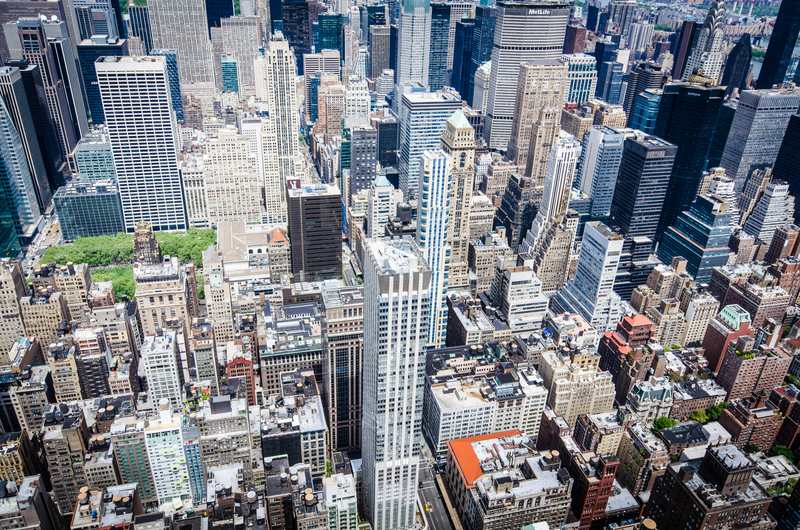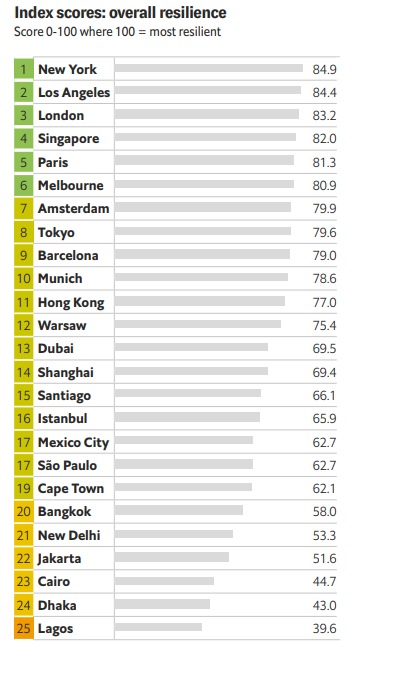
Photo: Mhaussmann | Dreamstime.com
New York, LA and London top resilient cities index
27 November 2023
by Sarah Wray
New York, Los Angeles and London were ranked top for overall resilience in a new assessment of 25 major global cities by Economist Impact. Lagos, Dhaka and Cairo received the lowest resilience scores overall.
The research defines urban resilience as “a city’s ability to avoid, withstand and recover from shocks, such as natural disasters, and from long-term stresses such as poverty, decrepit infrastructure or migration.”
Cities were scored on 19 indicators and 41 sub‑indicators across four key areas of resilience: critical infrastructure, environment, socio-institutional, and economic resilience.
Jonathan Birdwell, Global Head of Policy and Insights at Economist Impact, said: “It is often assumed that wealthier cities are relatively safer from shocks or crises, but our index proves otherwise. Our research definitively shows that some of the world’s most developed cities are still vulnerable to a vast array of socio-economic and environmental risks. Our index is one of the most up-to-date assessments of where cities must rapidly close the gaps in the market today.”

New York
Although New York ranks highest overall and scored well in areas such as cybersecurity, critical infrastructure, incentivising innovation, and environmental resilience, the city has still grappled with shocks.
During Hurricane Sandy in 2012, power blackouts affected several hospitals, leading to the evacuation of 200 patients. In June, the city scrambled to deal with smoke from Canadian wildfires and in September, New York declared a state of emergency due to heavy rainfall and flash flooding.
Last year, the City’s Office of the Comptroller told the city council: “Nearly a decade after Superstorm Sandy and six months after Hurricane Ida, we have not done enough to prepare for future storms.”
The scoring also found that New York could do more to integrate the vulnerable in resilience planning and to improve workforce resilience.
Other key findings in the report were that cities that use data and technology to create operational efficiencies and share information with their citizens are better at dealing with shocks.
The study found that emerging cities in particular urgently need to become more resilient to the effects of climate change and urged cities such as Bangkok, Cairo, Dubai, Jakarta and New Delhi to implement heat plans. Several cities in Asia – including Bangkok, Hong Kong, Jakarta and Dhaka – were identified as extremely vulnerable to flooding.
Cities had the lowest average scores in the economic pillar, dragging down some cities that performed well in other areas. This examined areas such as financial safety nets and a city’s ability to incubate innovation.
Action needed
The report said that while cities around the world are recognising the need to build resilience in the face of growing environmental, social and economic uncertainties, “translating intentions into action remains a formidable hurdle”.
Katrin Bruebach, Global Director of Programmes and Delivery, Resilient Cities Network, said: “A resilience strategy is not something developed at a desk by a city official. Cities need to bring a variety of stakeholders together around the table, including community representation and the poor and vulnerable.
“Depending on the kind of shock and stress, listening to the voices of the people most affected is important.”
The research was sponsored by insurance firm Tokio Marine Group.











